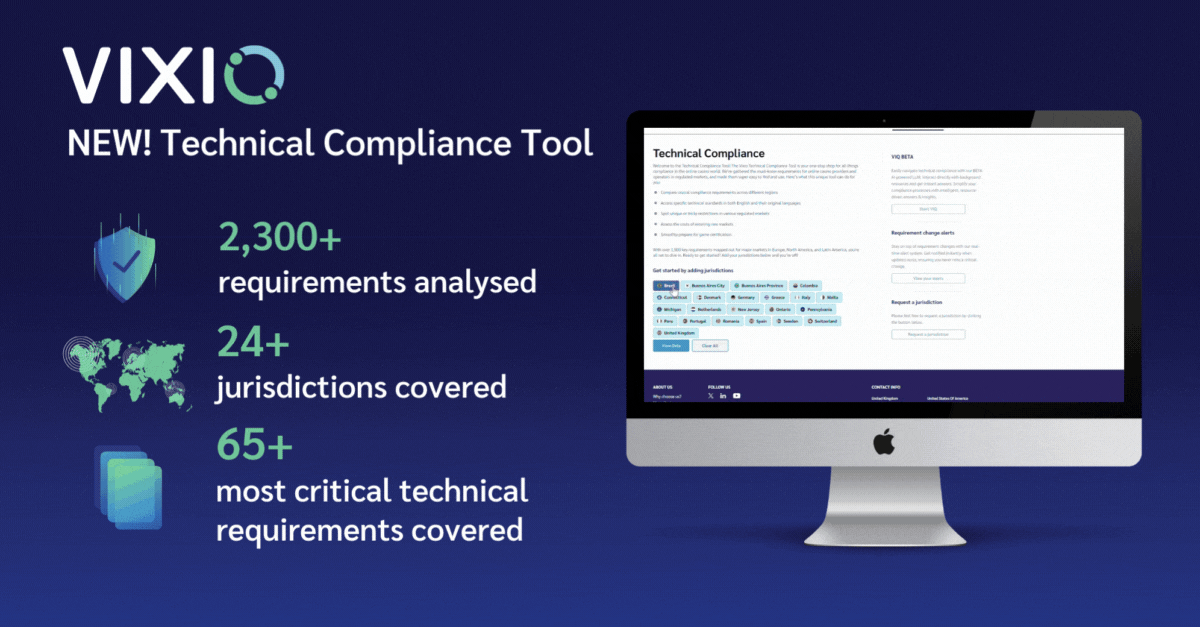UKGC CEO’s call for greater supplier due diligence comes in for criticism.
Cannibalization debate gets another kick by New Jersey’s October data.
The tribes kick up a fuss about courier lottery offerings in Texas.
The Thai government indicates casino legislation is all go.
What do you want from me, it's not how it used to be.
Unlock the power of real-time Ai facial recognition with Fincore’s TRI Biometrics:
Trigger any event instantly: such as blocking self-excluded players or welcoming VIPs.
Easy Integration: Works with almost any camera, including your current setup.
Actionable Insights: Use analytics to understand customer patterns and behaviour.
Trusted Accuracy: NIST-certified for reliable performance.
Black and white
Where we’re going, we don’t need Rhodes: The UK Gambling Commission’s CEO Andrew Rhodes has come in for criticism for his suggestion during a speech last week that UK online licensed operators should do more due diligence on their suppliers to "ensure" they are not also supplying operators in the black market.
Taking the opportunity of a speech at the UKGC’s CEO Briefing last Wednesday, Rhodes said the Commission expects more policing on the part of operators.
One step forwards: Rhodes noted that 12 months previously he had said he wanted to “encourage” operators to use their “commercial influence” with suppliers to “ensure they were taking all the relevant steps to verify they were not supporting illegal activity” in the UK.
“I’m going to go one step further than that today and strongly suggest you all undertake due diligence to ensure none of your suppliers are directly or indirectly engaged in supporting unlicensed activity in this market,” he added.
Two steps back: Taking to LinkedIn, Richard Williams, a gaming lawyer with Keystone Law, said this was an “incredibly difficult process for licensees to undertake.”
“For example, if a software developer supplied games to GB and non-GB licensed operators, how would the licensee know if a non-GB operator was allowing GB customers to gamble with it?”
“The same applies to payment providers and other third-party suppliers.”
Physician, heal thyself: Sources pointed out the inconsistencies of what Rhodes appears to be suggesting. One legal source noted this brought into question the Commission’s own processes when it comes to the licensing of suppliers.
“One would think [the operators] are entitled to rely on the Commission's licensing process when it comes to the suitability of their suppliers,” said the source, who spoke on condition of anonymity.
“So to then say, ‘we want you to police their suitability’ is in principle problematic and also practically hard to envisage.”
Needed – a spine: One industry source went further and said that by shifting the onus onto operators without clear guidelines or definitions the Commission was being “spineless and lazy.”
“Even then, will they take action themselves? Of course not,” the source complained.
Super disruptor: A more charitable response came from Simo Dragicevic, co-founder of The Game Safety Institute, who said his interpretation was that the Commission is “super focused on disrupting the illegal market.”
He added that the Commission was simply calling for all stakeholders to “continue to work together and increase efforts to disrupt it from all angles as nobody benefits from it in the long run.”
Vixio, a leading RegTech provider for gambling compliance, is thrilled to announce the Technical Compliance Tool, a single source of truth for technical requirements impacting the development, deployment, and certification of online casino games.
Managing game development alongside increasing compliance demands can slow your time to market—particularly when games must be certified according to complex, ever-changing requirements that vary across regions.
Vixio created the Technical Compliance Tool in partnership with clients to provide a consolidated view of the 65+ most critical technical requirements across the world’s largest regulated markets while linking to the original source.
Start saving countless hours navigating complicated regulations here.
+More
New Jersey: A proposed bill that aims to ban betting on college player props is reported to be gaining momentum in the state legislature. Bill A4905 would eliminate the offering of collegiate player props in the state, a move advocates say will help protect student athletes over concern of harassment and abuse.
If passed, New Jersey would join Ohio, Maryland, Vermont and Louisiana as recent states to ban college props.
FanDuel has settled the lawsuit filed by the Major League Baseball Players Association over the use of MLB players names and images on its platform, according to the Associated Press.
Lithuania is to ban gambling advertising from next July following approval by the country’s parliament. The embargo will be phased in, with sports competitions, team and player sponsorships, and broadcasts of competitions having until January 2028 to comply.
Carry on streaming: Argentine prosecutors are probing the appearance of a YouTuber in a league match for a side in the country’s top soccer division, following concerns the stunt may be linked to sports betting.
The influencer in question, Spreen (real name Ivan Buhajeruk), registered with Deportivo Riestra a few months ago and recently made it onto the pitch for 59 seconds during a game.
Separately, the country is also advancing plans to ban the advertising of online gambling and sports betting.
A resolution that would impose curbs across social networks, billboards, broadcast media and sponsorship of sports teams is heading for the Argentine congress.
Crossover traffic
Eating their own lunch: In a recent note, and following a meeting with operators at an investor conference, the analysts at Deutsche Bank noted the topic of the impact of iCasino on the B&M casino environment was a major theme of the discussions.
“While some may argue there is a debate as to the impact of one on the other, we stopped taking this ‘debate’ seriously long ago,” the analysts pointedly argued.
“The data, in our view, is and has been overwhelmingly obvious for some time.”
Nil by mouth: The team went on to say the argument that cannibalization is a thing has been one that has only been taken up by those who either don’t participate in, or have no major share of, the iCasino markets.
The team cited the performance of casino GGR in Pennsylvania, Michigan and New Jersey, three states with iCasino that either launched in 2021 or doubled relative to 2019.
In each, B&M casino comparisons have materially lagged comparisons in other markets across the Northeast, Midwest and Southeast.
Well, what do we have here? The comments were well-timed given they came out a couple of days ahead of the latest data from New Jersey, which showed iCasino overtaking B&M gaming in GGR terms in October.
Courier issues
On the doorstep: The proliferation of lottery courier services in Texas has added a further complication to the debates over whether the legalization of OSB or B&M gaming should be revisited in 2025.
Reasonable cause: According to local media, the Kickapoo Traditional Tribe of Texas informed the state Senate that if it didn’t rein in the online sales of Texas Lottery tickets, the tribe would pursue full-blown casino gambling in the state.
A letter from the tribe seen by The Dallas Express, dated early in October, said courier services represented an “expansion of gambling in the state.”
The tribe suggested the lottery couriers were a “workaround” for online gambling.
The Texas Lottery Commission claimed the courier services operate outside of their jurisdiction.
Kick it: The Kickapoo letter could also spell trouble for DraftKings, seeing as it cited its purchase of Jackpocket. Notably, the company was recently reported to be looking at ramping up its lobbying efforts in Texas via the hire of a Texas government affairs specialist.
A note this week from Deutsche Bank said there was “some optimism” that a Trump cabinet appointment for Texas Lieutenant Governor Dan Patrick could provide a boost for OSB efforts.
However, the team also noted recent comments from Patrick suggesting he won’t be heading to Washington DC have somewhat cooled the speculation.
No means of support: Patrick’s position on OSB legislation is he has stated he won’t bring the issue to the senate floor without the support of the Republican majority.
GuardDog, powered by Underdog, is a pioneering investment fund dedicated to fostering innovation in responsible gaming.
GuardDog supports and accelerates early-stage startups focused on building new and creative solutions to address problem gaming and further responsible gaming.
Ready to be one of the underdogs of responsible gaming?
Visit to apply: https://underdogfantasy.com/guarddog
Thai-ing the knot
Progress report: The Thai government is working on getting the draft bill that will legalize casino resorts passed by the country’s parliament by the end of next year, according to the secretary-general to the Prime Minister, Prommin Lertsuridej.
According to Bloomberg, Lertsuridej said the entertainment complex bill will be given the nod by PM Paetongtarn Shinawatra’s cabinet by the end of this year.
The measure will then pass to the lower House of Representatives and the upper house Senate next year. Consideration is likely to take a number of months for each house.
Clamor: “The law should be passed in six months from now at the earliest, so it should be next year to start,” Lertsuridej told Bloomberg. He told the news services there was “no shortage” of operators that have expressed an interest in operating within the country.
Tourist trail: On MGM Resorts’ Q3 earnings call, CEO Bill Hornbuckle noted he had recently completed his third trip to the country. “We like what we hear to date in terms of tax,” he said, talking about the proposed 17% gaming tax.
“We like the investment ratios that we hear. It's a great place to build relatively cheaply as compared to other markets,” he added.
“The cost of doing business there is extremely low. So from an operating margin perspective, we love the opportunity it could bring.”
30 something: Under the proposals, the entertainment complexes would be operated by Thai-registered companies, which would be given 30 year-licenses that would cost THB5bn (~$145m) initially plus THB1bn each subsequent year.
The government may initially grant five casino licenses in popular tourist destinations, with two in Bangkok and one each in Pattaya, Chiang Mai and Phuket, according to local media reports.
Webinar: Global Regulatory Frameworks for Safer Gambling: What’s Changing and Why?
As part of Safer Gambling Week and the EGBA calendar of events, Mindway AI proudly presents the “Global Regulatory Frameworks for Safer Gambling: What’s Changing and Why?” webinar.
This webinar will bring together leading experts and industry pioneers converge to discuss safer gambling legislation in markets such as Brazil which are set to go live and also in existing markets where a change of direction is in place.
Sign up here.
Event calendar
Nov 20: EGBA webinar series: safer gambling tools
Nov 21: EGBA webinar series: KYC and safer gambling
Nov 22: EGBA webinar series: safer gambling messaging
Dec 2-4: Thai Entertainment Complex Summit, Bangkok
An +More Media publication.
For sponsorship inquiries email scott@andmore.media.











